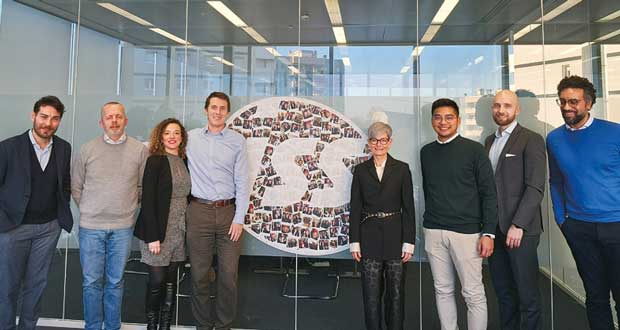ISS CLIENT SOLUTIONS
Porter moved into sales full time joining ISS in 2021 as one of several global solution leads who put together multi-service or IFM contracts for multi-country or multi-region deals. These may be brand new opportunities or retentions of existing accounts through ISS’ “Customer for Life” programme, which is a strategic focus on customer retention by enhancing customer loyalty and business performance.
Explains Porter: “With ISS’ Customer for Life programme, we really stay involved in our global key accounts. I’m with our operational team and understand whether we are delivering what we’ve promised in the contract and if there are any issues. As an industry I think we’re all becoming more proactive and focused as we should be on our existing client base, and that leads to good outcomes for both supplier and client.”
Whether retaining a client or securing a brand-new contract, Porter believes strongly in collaborating with clients in the most positive way to get the best IFM fit. While every client will talk to potential suppliers about the essential aspects of FM, including health and safety, operational risk, asset management, service levels, sustainability and ensuring consistency across multiple regions, it’s vital says Porter to acquire a deeper understanding of their needs to design a bespoke client solution.
“Early on in the process I’ll try to spend at least a couple of hours with the client to understand what is important to them.
“For instance, we met with a global engineering company for just over three hours, and I would say 90 per cent of the themes of our (Request for Proposal) RFP response came out of that discussion.
“There was five people on the client team, representing procurement and operations, and it was an open forum. I could ask any questions, and they gave us quality information about where they were, what they wanted to change, what they wanted to keep doing and where they wanted to go. That exploration stage is crucial, and I would really encourage all clients to allow this before any process, especially first generation. (First generation being if they’ve not consolidated services and/or combined countries together before).”
Porter is a big fan of the principles set out in the book by Robert Miller and Stephen Hyman ‘The new conceptual selling’, which he says champions productive exploration sessions with clients. When applied to FM it means getting to the ‘bespoke client concept’ of what matters to them.
Explains Porter: “There’s an awful lot of listening involved in understanding buyer’s needs. It takes a lot to understand the different stakeholders and their decision-making process and if ISS want to build the best IFM solution for a client, we’ve got to really understand what they’re looking for in key areas.
“I want to leave [the final contract meeting] where we’ve agreed a contract with the client and both of us feel satisfied, it is a win: win. Where the client feels like we’ve recognised what they’ve set out to achieve with their facility services and where this agreement is going to take them where they want to be. For ISS I want to know we haven’t over promised, but that we haven’t conceded too much either and our team is happy. That’s obviously going to start the foundation of a good partnership.”
PROCUREMENT AND OPERATIONAL BUYERS
When it comes to procurement, there are two main types of buyers, he says, procurement-based buyers and operational buyers. Increasingly Porter is seeing a mix between the two as operational teams become more involved as key stakeholders, especially as areas such as service excellence and workplace experience come to the fore.
While we’ve heard a lot of chatter recently about the importance of ESG, according to Porter, while social and environmental sustainability come up, they’re typically not the most critical factors for supplier selection.
Says Porter: “I think the reason for that is quite often the clients that we deal with, the procurement and operational leads at that stage, are not necessarily the ones responsible within a client’s organisation for delivering net zero goals or social initiatives and social welfare. However, once we go live and we meet more stakeholders from the wider business, we talk about what we can do to enhance ESG, and it organically becomes a growing part of our business.”





